- Home
- David McCullough
The American Spirit Page 10
The American Spirit Read online
Page 10
Information is useful. Information is often highly interesting. Information has value, sometimes great value. The right bit of information at the opportune moment can be worth a fortune. Information can save time and effort. Information can save your life. The value of information, facts, figures, and the like, depends on what we make of it—on judgment.
But information, let us be clear, isn’t learning. Information isn’t poetry. Or art. Or Gershwin or the Shaw Memorial. Or faith. It isn’t wisdom.
Facts alone are never enough. Facts rarely if ever have any soul. In writing or trying to understand history one may have all manner of “data” and miss the point. One can have all the facts and miss the truth. It can be like the old piano teacher’s lament to her student, “I hear all the notes, but I hear no music.”
If information were learning, you could memorize the World Almanac and call yourself educated. If you memorized the World Almanac, you wouldn’t be educated. You’d be weird!
Learning is not to be found on a printout. It’s not on call at the touch of the finger. Learning is acquired mainly from books, and most readily from great books. And from teachers, and the more learned and empathetic the better. And from work, concentrated work.
Abigail Adams put it perfectly more than two hundred years ago: “Learning is not attained by chance. It must be sought with ardor and attended with diligence.” Ardor, to my mind, is the key word.
For many of you of the graduating class, the love of learning has already taken hold. For others it often happens later and often by surprise, as history has shown time and again. That’s part of the magic.
Consider the example of Charles Sumner, the great Senator Charles Sumner of Massachusetts, whose statue stands in the Boston Public Garden facing Boylston Street.
Charles Sumner
As a boy in school Charles Sumner had shown no particular promise. Nor did he distinguish himself as an undergraduate at Harvard. He did love reading, however, and by the time he finished law school, something overcame him. Passionate to know more, learn more, he put aside the beginnings of a law practice and sailed for France on his own and on borrowed money, in order to attend lectures at the Sorbonne. It was a noble adventure in independent scholarship, if ever there was.
Everything was of interest to him. He attended lectures on natural history, geology, Egyptology, criminal law, the history of philosophy, and pursued a schedule of classical studies that would have gladdened the heart of the legendary Father Thayer of Boston College. He attended lectures at the Paris medical schools. He went to the opera, the theater, the Louvre, all the while pouring out his excitement in the pages of his journal and in long letters home. Trying to express what he felt on seeing the works of Raphael and Leonardo da Vinci at the Louvre, he wrote, “They touched my mind, untutored as it is, like a rich strain of music.”
But there was more. Something else touched him deeply. At lectures at the Sorbonne he had observed how black students were perfectly at ease with and well received by the other students. The color of one’s skin seemed to make no difference. Sumner was pleased to see this, though at first it struck him as strange. But then he thought, as he wrote, that maybe the “distance” between blacks and whites at home was something white Americans had been taught and that “does not exist in the nature of things.” And therein was the seed from which would later arise, in the 1850s, before the Civil War, Charles Sumner’s strident stand on the floor of the United States Senate against the spread of slavery. From his quest for learning he brought home a personal revelation he had not anticipated and it changed history.
When I set out to write the life of John Adams, I wanted not only to read what he and Abigail wrote, but to read as much as possible of what they read. We’re all what we read to a very considerable degree.
So there I was past age sixty taking up once again, for the first time since high school and college English classes, the essays of Samuel Johnson and works of Pope, Swift, and Laurence Sterne. I read Samuel Richardson’s Clarissa, which was Abigail’s favorite novel; and Cervantes—Don Quixote—for the first time in my life. What a joy!
Cervantes is part of us, whether we know it or not. Declare you’re in a pickle; talk of birds of a feather flocking together; vow to turn over a new leaf; give the devil his due; or insist that mum’s the word, and you’re quoting Cervantes every time.
Miguel de Cervantes
John Adams read everything—Shakespeare and the Bible over and over, and the Psalms especially. He read poetry, fiction, history. Always carry a book with you on your travels he advised his son John Quincy. “You will never be alone with a poet in your pocket.” In a single year, according to the U.S. Department of Education, among all Americans with a college education, fully a third read not one novel or short story or poem. Don’t be one of those, you of the Class of 2008.
Make the love of learning central to your life. What a difference it can mean. And remember, as someone said, even the oldest book is brand-new for the reader who opens it for the first time.
You have had the great privilege of attending one of the finest colleges in the nation, where dedication to classical learning and to the arts and sciences has long been manifest. If what you have learned here makes you want to learn more, well that’s the point.
Read. Read, read! Read the classics of American literature that you’ve never opened. Read your country’s history. How can we profess to love our country and take no interest in its history? Read into the history of Greece and Rome. Read about the great turning points in the history of science and medicine and ideas.
Read for pleasure, to be sure. I adore a good thriller or a first-rate murder mystery. But take seriously—read closely—books that have stood the test of time. Study a masterpiece, take it apart, study its architecture, its vocabulary, its intent. Underline, make notes in the margins, and after a few years, go back and read it again.
Make use of the public libraries. Start your own personal library and see it grow. Talk about the books you’re reading. Ask others what they’re reading. You’ll learn a lot.
And please, please, do what you can to cure the verbal virus that seems increasingly rampant among your generation. I’m talking about the relentless, wearisome use of the words “like” and “you know” and “awesome” and “actually.” Listen to yourselves as you speak.
Just imagine if in his inaugural address John F. Kennedy had said, “Ask not what your country can, you know, do for you, but what you can, like, do for your country actually.”
The energetic part so many of you are playing in this year’s presidential race is marvelous. Keep at it, down to the wire. Keep that idealism alive. Make a difference.
Go out and get the best jobs you can and go to work with spirit. Don’t get discouraged. And don’t work just for money. Choose work you believe in, work you enjoy. Money enough will follow. Believe me, there’s nothing like turning every day to work you love.
Walk with your heads up. And remember, honesty is the best policy; and yes that, too, is from Cervantes.
My warmest congratulations. In the words of the immortal Jonathan Swift, “May you live all the days of your life.”
The Summons to Serve
DALLAS, TEXAS
November 22, 2013
He spoke to us in that now distant time past with a vitality and sense of purpose such as we had never heard before. He was young to be president, but it didn’t seem so if you were younger still. He was ambitious to make it a better world, and so were we. “Let the word go forth [he said] . . . that the torch has been passed to a new generation of Americans.”
It was an exciting time. He talked of all that needed to be done, of so much that mattered—equal opportunity, unity of purpose, education, the life of the mind and spirit, art, poetry, service to one’s country, the courage to move forward into the future, the cause of peace on earth.
His was the inspiring summons to serve, to hard work and worthy accomplishment, a summons we lo
nged for. He was an optimist and he said so. But there was no sidestepping reality in what he said, no resorting to stale old platitudes.
David McCullough, Dallas, November 22, 2013
He spoke to the point and with confidence. He knew words matter. His words changed lives. His words changed history. Rarely has a commander-in-chief addressed the nation with such command of language.
Much that he said applies now no less than half a century ago and will continue, let us hope, to be taken to heart far into the future.
“Gone but not forgotten” is the old expression for departed heroes. But if not forgotten, they are not gone.
On this day especially, and at this place, let us listen again to some of what John F. Kennedy said:
“The New Frontier of which I speak is not a set of promises—it is a set of challenges. It sums up not what I intend to offer the American people, but what I intend to ask of them.”
“This nation was founded by men of many nations and backgrounds. It was founded on the principle that all men are created equal, and that the rights of every man are diminished when the rights of one man are threatened. . . . The heart of the question is . . . whether we are going to treat our fellow Americans as we want to be treated.”
• • •
“We must educate our children as our most valuable resource. . . .
“We must have trained people—many trained people—their finest talents brought to the keenest edge. We must have not only scientists, mathematicians, and technicians. We must have people skilled in the humanities. . . .
“I look forward to an America which will reward achievement in the arts as we reward achievement in business or statecraft. . . . I look forward to an America which commands respect throughout the world not only for its strength but for its civilization.”
“This country cannot afford to be materially rich and spiritually poor.”
“Art is the great unifying and humanizing experience.”
“The life of the arts, far from being an interruption, a distraction in the life of a nation, is very close to the center of a nation’s purpose—and it is the test of the quality of a nation’s civilization.”
“I am certain that after the dust of centuries has passed over our cities, we, too, will be remembered not for our victories or defeats in battle or in politics, but for our contributions to the human spirit.”
“If more politicians knew poetry, and more poets knew politics, I am convinced the world would be a little better place to live.”
“When power leads man towards arrogance, poetry reminds him of his limitations. When power narrows the areas of man’s concern, poetry reminds him of the richness and diversity of his existence. When power corrupts, poetry cleanses, for art establishes the basic human truth which must serve as the touchstone of our judgment.”
• • •
“Together let us explore the stars, conquer the deserts, eradicate disease, tap the ocean’s depths.”
“Those who came before us made certain that this country rode the first waves of the industrial revolution, the first waves of modern invention, the first waves of nuclear power, and this generation does not intend to founder in the backwash of the coming age of space. We mean to be part of it. . . . We set sail on this new sea because there is to be new knowledge to be gained, and new rights to be won, and they must be won and used for the progress of all people. . . . But why, some say, the Moon? Why choose this as our goal? . . . We choose to go to the Moon in this decade, and to do the other things, not because they are easy, but because they are hard; because that goal will serve to organize and measure the best of our energies and skills; because that challenge is one we are willing to accept, one we are unwilling to postpone, and one which we intend to win.”
• • •
John F. Kennedy at Rice University announcing that we will go to the Moon
“The goal of a peaceful world . . . is our guide for the present and our vision for the future . . . the quest is the greatest adventure of our century. We sometimes chafe at the burden of our obligations, the complexity of our decisions, the agony of our choices. But there is no comfort or security . . . in evasion, no solution in abdications, no relief in irresponsibility.”
“The problems of the world cannot possibly be solved by skeptics or cynics, whose horizons are limited by the obvious realities. We need men who can dream of things that never were, and ask why not?”
• • •
“Those things that we talk about today, which seem unreal, where so many people doubt that they can be done—the fact of the matter is, it has been true all through our history—they will be done.”
Again and again John Kennedy’s words are fired with his love of life, his love of his country and its history. He read history, he wrote history, and he understood that history is not just about times past, but also about those who populate the present, each new generation as he liked to say, and that we, too, will be judged by history. And that we owe it to those who went before and those who will follow, to measure up, and, yes, even surpass the achievements of the past with what we accomplish and with the values we hold dear.
He also knew from his reading and from experience that very little of consequence is ever accomplished alone, but by joint effort. America has been a joint effort all down the years and we must continue in that spirit.
As he himself said, “For I can assure you that we love our country, not for what it was—though it has always been great—not for what it is—though of this we are deeply proud—but what it someday can and, through the efforts of us all, someday will be.”
As his campaign song said, he had high hopes. So do we.
Draft of John F. Kennedy’s inaugural address
A Building Like No Other
U.S. CAPITOL HISTORICAL SOCIETY
Washington, D.C.
2016
So here we are in the Capitol of the United States of America on Capitol Hill, the acropolis of our nation. It is a building like no other in the land, wherein the highest aspirations of a free and open society have been written into law, generation after generation, where, time and again, brave and eloquent words have changed history, and where the best and some of the worst of human motivations have been plainly on display.
This magnificent structure has been called “the temple of liberty” . . . “the spirit of America writ in stone” . . . “a mighty engine” . . . “an ennobling shrine” . . . “a city unto itself.” Thomas Jefferson called it “the great commanding theater” of the nation. It may also be said that here on this site, within these walls, there is an abundance of story such as to be found in no other structure in our country.
Some have likened the Congress to an ever-flowing river, the content of which keeps steadily changing. From the time Congress first took up its business here on the Hill in 1800 more than eleven thousand men and women have come and gone as members of the House and Senate. The current elected members number 535. But the continuing population of this “city unto itself” is greater by far. There are a total of 1,800 Capitol Hill police serving, or a force more than three times the size of Congress. Some one hundred engineers look after the electricity, plumbing, and fire protection. Another army of workers maintains the grounds. Barbers, chefs, waiters and waitresses, a resident physician, and congressional staff members are also part of the workforce within the building.
Then there are the sixty-five tour guides who serve a steady flow of visitors numbering from three to five million a year—men, women, schoolchildren by the thousands from all parts of the country and the world.
I set foot here first as a high school student all the way from Pittsburgh. I was fifteen.
It is fitting that we do justice to the past, and that we travel far and wide to see where our history happened—to the birthplaces and homes of our notables, to Independence Hall and battlefields and legendary river crossings. But think of the volume and range and the immense consequences of so much that
has taken place at this one site—the passing of the Fourteenth Amendment, for example, or the declarations of two world wars, or approval of the Marshall Plan and building an interstate highway system like no other on earth. It was here during the Great Depression that Franklin Roosevelt said, “the only thing we have to fear is fear itself.” Here, in an inaugural address known the world over, that John Kennedy called on us to “Ask not what your country can do for you—ask what you can do for your country.”
To be sure, there has been no absence of pointless onstage preening in this “great commanding theater,” no shortage of self-serving blather and endless days taken up with matters unbearably dull. “We have the power to do any damn fool thing we want to do, and we seem to do it about every ten minutes,” one senator, William Fulbright, commented fifty years ago. And now we are confronted with the disgraceful “Dialing-for-Dollars” reality of things as they are currently in Congress.
But then history is human. History is composed of the bad and the good, as much of the goings-on here amply illustrate. There was that day on the Senate floor in 1856 when political anger turned to manic rage and a South Carolina congressman, Preston Brooks, attacking from behind with a heavy cane, tried to club to death the outspoken abolitionist Senator Charles Sumner of Massachusetts and nearly succeeded.
And there was the day in 1950 when a freshman senator from Maine, Margaret Chase Smith, had the courage to stand and challenge Senator Joseph McCarthy as no one had, saying that those who shouted loudest about Americanism all too frequently ignored such basic principles of Americanism as “the right to criticize, the right to hold unpopular beliefs, the right to protest, the right of independent thought.”

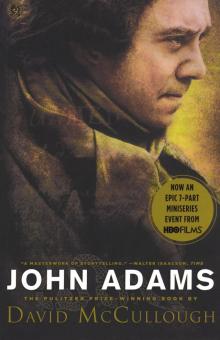 John Adams
John Adams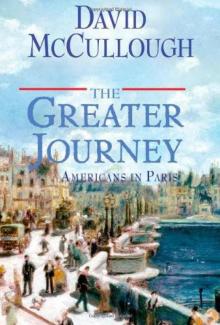 The Greater Journey: Americans in Paris
The Greater Journey: Americans in Paris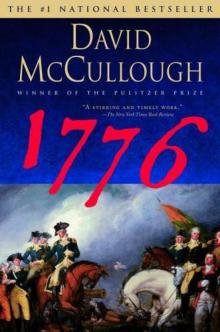 1776
1776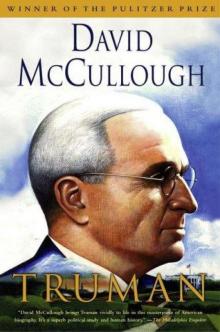 Truman
Truman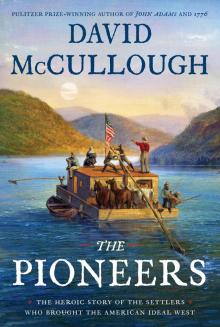 The Pioneers
The Pioneers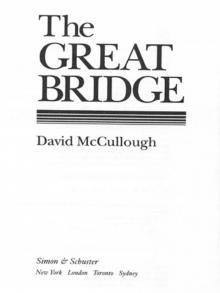 The Great Bridge: The Epic Story of the Building of the Brooklyn Bridge
The Great Bridge: The Epic Story of the Building of the Brooklyn Bridge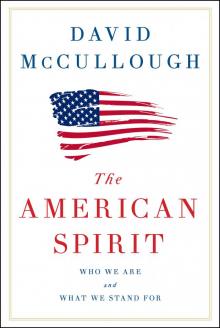 The American Spirit
The American Spirit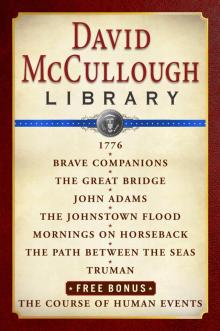 David McCullough Library E-book Box Set
David McCullough Library E-book Box Set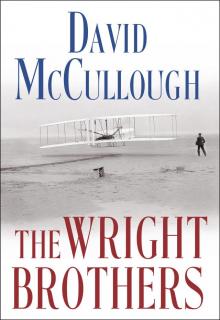 The Wright Brothers
The Wright Brothers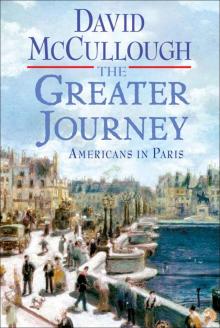 The Greater Journey
The Greater Journey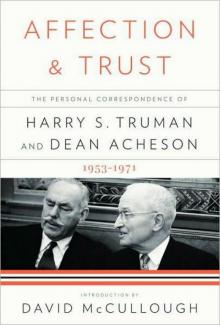 Affection and Trust: The Personal Correspondence of Harry S. Truman and Dean Acheson, 1953-1971
Affection and Trust: The Personal Correspondence of Harry S. Truman and Dean Acheson, 1953-1971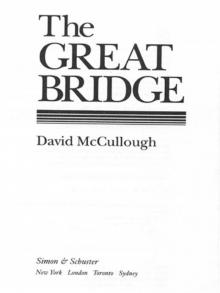 The Great Bridge
The Great Bridge